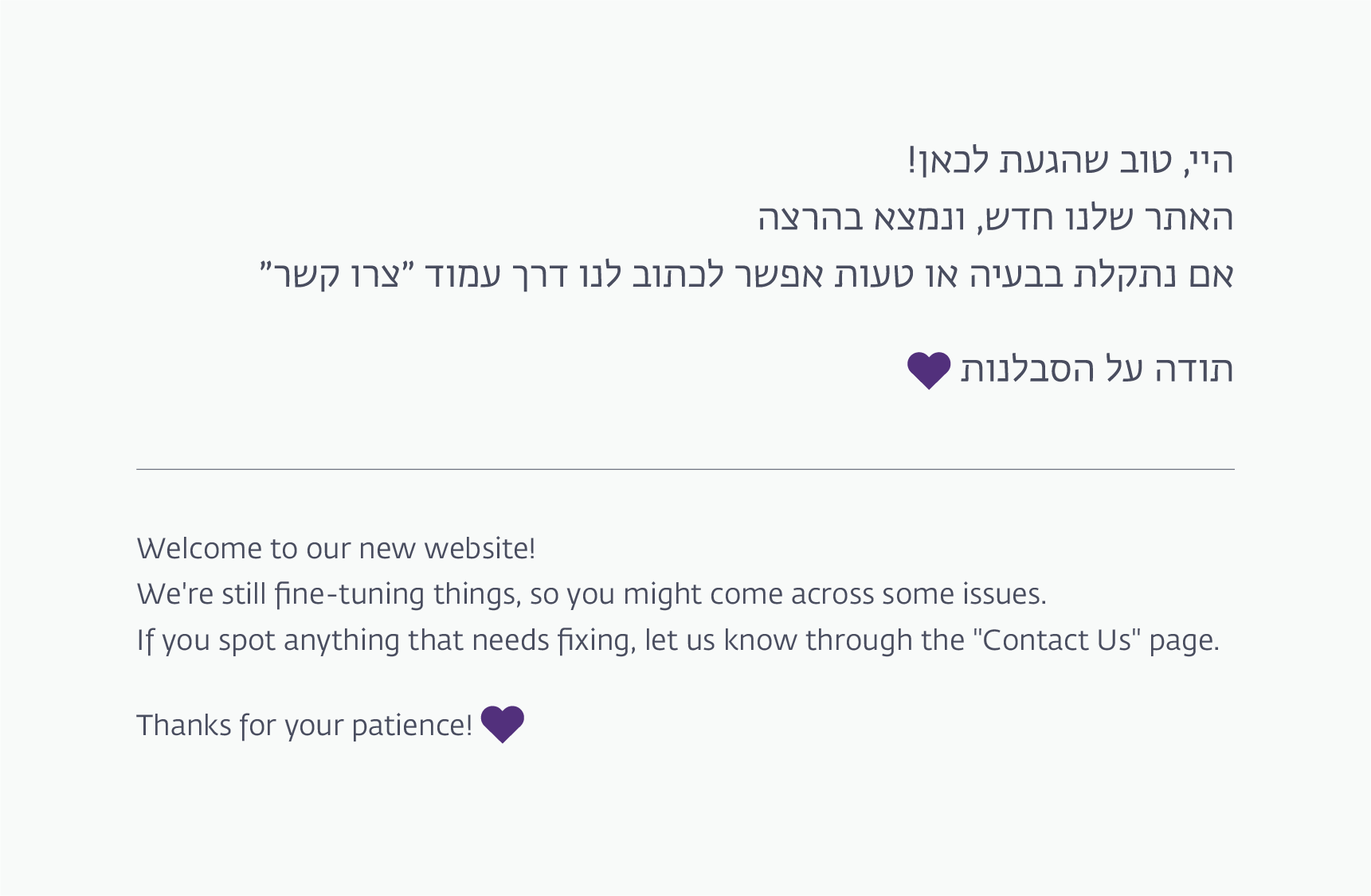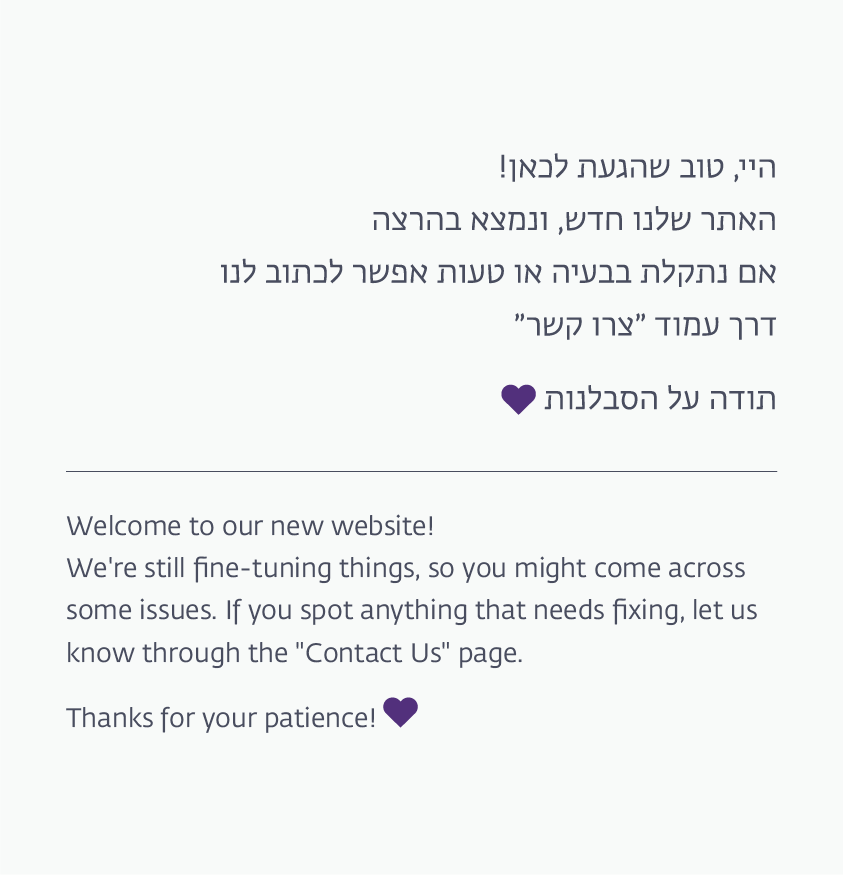Dedicated Psychiatric Hospitalization
In short:
- It is possible to receive psychological and psychiatric treatment following sexual assault through psychiatric hospitalization in a dedicated unit or a general psychiatric ward.
- Psychiatric hospitalization offers short-term intensive care, with the goal of returning to the community as soon as possible and continuing treatment there.
- Support centers can assist in finding appropriate hospitalization options and in locating follow-up care within the community.

Sexual assault is a traumatic event, or a series of traumatic events, that may lead to post-traumatic stress disorder (PTSD) or complex PTSD (for more information on psychological effects, click here). A history of sexual assault—and PTSD in particular—is associated with a range of complex symptoms and conditions, such as anxiety attacks, dissociation, eating disorders, depression, addictions, self-harm, and even suicidal attempts. Sometimes these symptoms appear soon after the assault, and sometimes only years later.
In addition to various community-based treatment options, severe mental health crises may require more intensive interventions, such as day treatment or full psychiatric hospitalization. Psychiatric hospitalization is inherently complex, but survivors of sexual trauma often have unique needs that require tailored, trauma-informed care. While ideally all psychiatric hospitalization systems would operate with a trauma-informed approach—especially given the high number of survivors who require such care—currently there are only a few dedicated hospitalization services in Israel specifically for survivors, within psychiatric hospitals and wards.
As a general rule, these dedicated hospitalization programs are elective (i.e., voluntary and not involuntary) and operate within open wards.
How is Psychiatric Hospitalization for Survivors Conducted?
There are two main types of dedicated psychiatric hospitalization for survivors of sexual trauma:
- “Supportive Hospitalization Beds” (“אשפוזי מעטפת”)
These are designated beds for survivors of sexual trauma within general hospital psychiatric wards.- The hospitalization is elective (voluntary)
- Takes place in an open ward
- Usually lasts about two to three weeks
- The goal is to stabilize the mental state and enable a return to continued treatment in the community.
- Dedicated Wards for Survivors of Sexual Trauma in psychiatric hospitals
These wards differ from one another in their treatment programs and structures- They are also elective hospitalizations (not involuntary)
- The treatment duration is typically a few weeks, though it may vary depending on the need
- Often includes or requires continued treatment in the community
- Some of these programs are designed to accommodate repeated or long-term care, when necessary.
These frameworks aim to provide trauma-informed care in a safe and voluntary setting, tailored to the specific needs of survivors.
Who Can Apply for Dedicated Psychiatric Hospitalization?
These hospitalization frameworks are intended for survivors (female or male) over the age of 18.
- All supportive hospitalization programs (“אשפוזי מעטפת”) accept male survivors.
Some specialized units are designated for female survivors only (see the list of programs below for more details).
Admission Process:
- Most hospitalizations require a pre-admission interview and assessment of suitability.
- In some cases, there may be a waiting period until a bed becomes available.
- Most dedicated hospitalization programs require that the person is already involved in community-based treatment, and is suitable for care in an open ward.
- You can apply for hospitalization at any location, regardless of where you live.
- Before arriving at the unit, it’s important to contact the facility, confirm your eligibility, and find out which documents are needed for admission.
In Case of Emergency:
It is recommended to go directly to a psychiatric emergency room, without needing a referral.
Is Dedicated Hospitalization Free of Charge?
Yes — the treatment is provided at no cost.
How Can One Apply for Dedicated Hospitalization?
- Most facilities require a referral or letter from a community-based mental health professional.
- You can also get help from rape crisis centers (support centers) for locating appropriate care and making a referral.
To do this, you can contact them by phone, chat, or WhatsApp, and request to speak with a support coordinator.
Dedicated Hospitalization Frameworks for Survivors
The information on available dedicated hospitalization options was collected using the resource guide by HIPAM – the Israeli Society for the Promotion of Diagnosis, Treatment, and Prevention of Sexual Abuse.
Hospitalizations in Dedicated Wards in Psychiatric Hospitals
Referrals to dedicated psychiatric hospitalizations must be made through a treating professional in the community, not directly by the patient. You can also contact support centers for help with referral to a dedicated hospitalization program.
Lev HaSharon Mental Health Center
“Focused Hospitalization” Program – A 16-day program designed to stabilize acute mental health conditions such as heightened suicidal risk, dissociative states, or severe depressive episodes.
- Referral is via a mental health provider or through the hospital’s emergency room.
- The program is open to women and men over the age of 18.
Phone: 09-8980429 (voicemail available)
Email (Head Nurse): yuliaf@lev-hasharon.co.il
Website: Lev HaSharon Mental Health Center
Here’s an organized summary of the dedicated psychiatric hospitalization options you shared, translated into English:
Merhavim – Be’er Ya’akov
“Bedarkei” Department
- For women survivors in crisis with complex post-trauma background.
- Short-term treatment based on personalized goals, using Dialectical Behavior Therapy (DBT).
- Open ward, women only.
- How to apply: Send a consolidated referral email including:
- Personal letter from patient explaining reason and goals of hospitalization
- Referral letter from community therapist
- Summary of last hospitalization (if any)
- Updated medical summary from treating doctor (diagnoses, medications)
Phone: 08-9258467 (8:00–12:00)
Email: merhavim.bedarki@moh.gov.il
Bedarkei Department Website
Sha’ar Menashe Mental Health Center
- Open ward, mixed-gender.
- For acute conditions.
- Contact: neta.magen@pbsh.health.go.il
Jerusalem Mental Health Center – Kfar Shaul
- Dedicated inpatient unit in an open ward, mixed-gender.
- Leave and vacations coordinated in advance.
- Phone: 02-6551551 ext. 2646 or 2630 (voicemail available)
- Unit Coordinator Email: hadar.s@psjer.health.gov.il
Be’er Sheva Mental Health Center
- Closed ward, mixed-gender.
- Leave at staff discretion.
- Admission through ER or prior coordination.
- Phone: 08-6401748
“Supportive Hospitalization” — Designated Beds in General Hospitals
Ziv Medical Center, Safed
- Open ward, mixed-gender.
- Weekend leaves.
- Phone: 04-6828179
Rambam Medical Center, Haifa
- Open ward, mixed-gender.
- Leaves by coordination.
- Phone: 04-7773037
“Magen Hospitalization” – Ichilov Medical Center, Tel Aviv
- Open ward for women only.
- Referral through treatment professionals or via support center.
- Includes treatment goals and inclusion/exclusion criteria (link available).
Referral form available for clinicians.
Barzilai Medical Center, Ashkelon
- Open ward, mixed-gender.
Supportive beds not separated from rest of ward.
Phone: 08-6745406
Last updated: 09.06.2025


